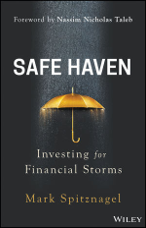For most investors and private equity professionals, new dealflow and progress on existing deals tends to slow down slightly during the summer months. As any tenacious deal professional will tell you, however, the work is really never “done.” Even while out of office, or enjoying an early departure, there’s still plenty to do, and plenty to be learned.
In this article, we review the top five books for dealmakers and investment professionals to read this summer, along with the key lessons to bring back to the office.

1. The Behavioral Investor, by Dr. Daniel Crosby
The author of this book is a behavioral finance expert and psychologist who examines the factors that impact investment decisions. He provides thoughtful suggestions on ways to change that behavior to decrease the likelihood of making poor choices.
This book speaks directly to people who directly manage assets, and those who manage teams of investors. It also provides guidance and tips for making consistent, strategic choices. If you’re short on time, check out Daniel Crosby’s video series, made in collaboration with InvestmentNews.

2. Safe Haven: Investing for Financial Storms, by Mark Spitznagel
For those involved in fundraising, the words “safe” and “secure” are likely a regular part of your vocabulary. For the entire investment community, a safer investment portfolio is certainly a regular pursuit.
In this book, hedge fund manager turned author explores the role of safe haven investments and the position they take in portfolios. While this asset class is quite broad, among the area discussed and analyzed are precious metals, commodities, U.S. treasuries, currencies and cryptocurrencies, real estate, art, equity strategies, hedge funds, risk parity, CTAs, CDSs, VIX, and tail-hedging. Click here to watch Spitznagel’s 10-minute speech at Bloomberg Invest New York in 2017.

3. The Power of Habit, by Charles Duhigg
Business development and private equity giants will preach that enduring relationships and decades of experience are the keys to success in the industry. In this book, long-time New York Times reporter and author Charles Duhigg examines the relationship between one’s success and their understanding of their own habitual behavior.
In a departure from the other finance-specific books on this list, this book offers a compelling look into why procedures, processes and technology matter to institutions. As experts in the process-oriented aspects of the investing world, we here at DealCloud tend to think that good habits are a key part of any CRM implementation, and that regular and repetitive use of technology can be the difference between success and failure.

4. When the Wolves Bite, by Scott Wapner
Whether you’re solely interested in the private markets or a regular public market day-trader, you’ve surely heard of activist investor and finance industry titans Bill Ackman and Carl Icahn. In this book, author Scott Wapner (who is also host of CNBC’s Fast Money) follows the long battle between the two men that began with the accusation that Herbalife was a pyramid scheme.
This book is fit for many audiences, ranging from those who followed the action as it unfolded, to industry newcomers who stand to learn a thing or two about Wall Street and its relationship with the Federal Trade Commission. Click here to listen to an interview between Jill Schlesinger (of Jill on Money fame) and the author on the “Better Off” podcast.

5. The CEO Next Door, by Elena Botelho and Kim Powell
If this book’s stature as a New York Times and Wall Street Journal Bestseller isn’t enough, one needs only remember that the research on which this book is written is based on a study that included over 17,000 C-suite executives (of which over 2,000 are CEOs).
No matter the role you play in the investment banking, private equity, and financial world at large, this book examines the four behaviors that “transform ordinary people into world-class leaders.” For those investors looking to increase their knowledge of portfolio company talent acquisition and management world, this book is likely a valuable read. Click here to read the book’s key findings in the Harvard Business Review.
